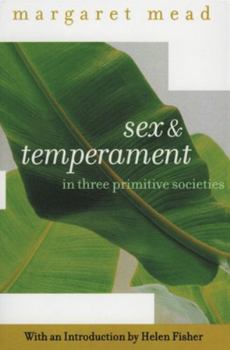Sex and Temperament: In Three Primitive Societies
Select Format
Select Condition 
Book Overview
A precursor to Mead's illuminating Male & Female, Sex & Temperament lays the groundwork for her lifelong study of gender differences. First published in 1935, Sex & Temperament is a fascinating and brilliant anthropological study of the intimate lives of three New Guinea tribes from infancy to adulthood. Focusing on the gentle, mountain-dwelling Arapesh, the fierce, cannibalistic Mundugumor, and the graceful headhunters of...
Format:Paperback
Language:English
ISBN:0060934956
ISBN13:9780060934958
Release Date:May 2001
Publisher:Harper Perennial
Length:352 Pages
Weight:0.35 lbs.
Dimensions:0.9" x 5.5" x 8.0"
Customer Reviews
2 ratings
And now...a constructive review of Mead's book
Published by Thriftbooks.com User , 15 years ago
"Sex and Temperament" by Margaret Mead was first published in 1935. The book is an anthropological study of three tribal cultures in New Guinea. The book still creates controversy, since Mead very explicitly connected her observations to a feminist and left-wing political agenda. Mead believed that human nature was malleable, and that the patriarchal gender roles in modern America were cultural constructs, and therefore could be changed. This still rubs many people the wrong way (see some of the other customer reviews). "Sex and Temperament" is very well-written, almost captivating, and gives you an eerie feeling that you are present in New Guinea together with Mead and the somewhat strange peoples she was investigating. From a purely literally point of view, it's a tour de force. Mead's political message is also crystal clear: she criticizes authoritarian childrearing practices, male dominance, and discrimination against "deviants". I read the book from cover to cover over a week-end. The book describes the way of life of three quite different peoples in the northeast part of New Guinea, then under British control. The Mundugumor and the Tchambuli lived along the Sepik River, while the Arapesh dwelled in the hills further north. In Mead's opinion, the Arapesh were a gentle people who promoted peaceful co-operation among both men and women, while the Mundugumor were cannibals and head-hunters, who promoted aggressiveness among both sexes. The Tchambuli, most sensationally of all, lived in a kind of matriarchy where the women were dominant and the men submissive. Critics of the book usually attack Mead's descriptions of the Arapesh and the Tchambuli (called Chambri in later sources). Despite the criticism, there is nothing inherently implausible about Mead's descriptions of the Arapesh. Mead does idealize them, but she nevertheless reports the facts so objectively, that a dispassionate reader can question her own interpretations. The Arapesh turn out to be a patriarchal society that practices infanticide of female babies, treats people with skin disease as out-casts, and have an almost "Straussian" view of their own religion. The initiated men of the Arapesh know very well that their tribal god is a fiction whose function is to keep people in line. On a more positive note, the Arapesh emphasize consensus, co-operation and sharing. Their chiefs have a mostly symbolic function, and violence between the villages is never allowed to escalate beyond a certain point. Anthropologists have described relatively egalitarian cultures in other parts of the world as well, and archeological excavations prove that at least one ancient high culture was peaceful, the Indus Valley Civilization, which incidentally also had strangely egalitarian traits. So what's the big deal about the Arapesh? It's also obvious from Mead's description that the co-operation among this people is to a great extent enforced, rather than voluntary, and that their society is less e
A classic
Published by Thriftbooks.com User , 20 years ago
Margaret Mead provided the foundation for many of the attitudes and philosophies of the mid-century's women's movement. Her insights into the culturally-based gender roles was a cornerstone in our understanding of humanity. This profound study of three very different societies, seperated by geography in remote New Guinea, clearly showed that culture can control our behavior. We can only conclude by her research that we must allow freedom for the individual, first and foremost, if we are to fully reach our potential as individuals.




